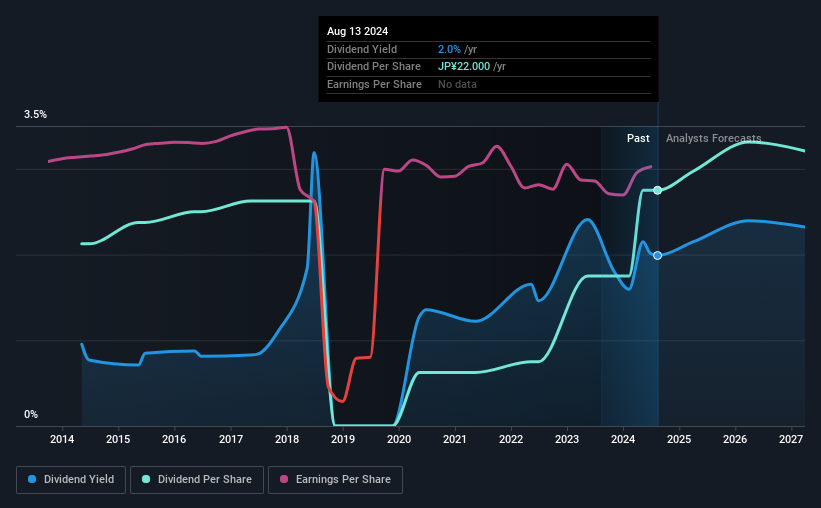
Suruga Bank Ltd. (TSE:8358) will pay a dividend of ¥11.00 on the 12th of December. Although the dividend is now higher, the yield is only 2.0%, which is below the industry average.
See our latest analysis for Suruga Bank
Suruga Bank's Earnings Will Easily Cover The Distributions
The dividend yield is a little bit low, but sustainability of the payments is also an important part of evaluating an income stock.
Suruga Bank has established itself as a dividend paying company with over 10 years history of distributing earnings to shareholders. Using data from its latest earnings report, Suruga Bank's payout ratio sits at 23%, an extremely comfortable number that shows that it can pay its dividend.
EPS is set to fall by 0.06% over the next 12 months. But if the dividend continues along the path it has been on recently, we estimate the future payout ratio could be 23%, which would be comfortable for the company to continue in the future.

Dividend Volatility
The company's dividend history has been marked by instability, with at least one cut in the last 10 years. Since 2014, the annual payment back then was ¥17.00, compared to the most recent full-year payment of ¥22.00. This works out to be a compound annual growth rate (CAGR) of approximately 2.6% a year over that time. Modest growth in the dividend is good to see, but we think this is offset by historical cuts to the payments. It is hard to live on a dividend income if the company's earnings are not consistent.
The Dividend Looks Likely To Grow
With a relatively unstable dividend, it's even more important to see if earnings per share is growing. Suruga Bank has impressed us by growing EPS at 19% per year over the past five years. Suruga Bank definitely has the potential to grow its dividend in the future with earnings on an uptrend and a low payout ratio.
Suruga Bank Looks Like A Great Dividend Stock
Overall, a dividend increase is always good, and we think that Suruga Bank is a strong income stock thanks to its track record and growing earnings. The distributions are easily covered by earnings, and there is plenty of cash being generated as well. We should point out that the earnings are expected to fall over the next 12 months, which won't be a problem if this doesn't become a trend, but could cause some turbulence in the next year. Taking this all into consideration, this looks like it could be a good dividend opportunity.
Investors generally tend to favour companies with a consistent, stable dividend policy as opposed to those operating an irregular one. At the same time, there are other factors our readers should be conscious of before pouring capital into a stock. To that end, Suruga Bank has 2 warning signs (and 1 which is significant) we think you should know about. If you are a dividend investor, you might also want to look at our curated list of high yield dividend stocks.
New: Manage All Your Stock Portfolios in One Place
We've created the ultimate portfolio companion for stock investors, and it's free.
• Connect an unlimited number of Portfolios and see your total in one currency
• Be alerted to new Warning Signs or Risks via email or mobile
• Track the Fair Value of your stocks
Have feedback on this article? Concerned about the content? Get in touch with us directly. Alternatively, email editorial-team (at) simplywallst.com.
This article by Simply Wall St is general in nature. We provide commentary based on historical data and analyst forecasts only using an unbiased methodology and our articles are not intended to be financial advice. It does not constitute a recommendation to buy or sell any stock, and does not take account of your objectives, or your financial situation. We aim to bring you long-term focused analysis driven by fundamental data. Note that our analysis may not factor in the latest price-sensitive company announcements or qualitative material. Simply Wall St has no position in any stocks mentioned.
About TSE:8358
Suruga Bank
Provides various banking and financial products and services to individuals and corporate customers in Japan.
Proven track record with adequate balance sheet.
Market Insights
Community Narratives




